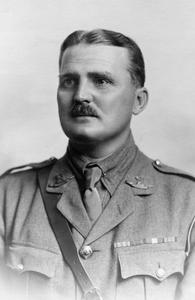John Sherwood Kelly | |
|---|---|
 John Sherwood-Kelly VC | |
| Born | 13 January 1880 Lady Frere, Eastern Cape |
| Died | 18 August 1931 (aged 51) London |
| Buried | 51°18′03″N 0°37′29″W / 51.300770°N 0.624731°W |
| Allegiance | |
| Service | |
| Years of service | 1896−1919 |
| Rank | Brigadier |
| Unit | Norfolk Regiment |
| Commands | 1st Battalion, Royal Inniskilling Fusiliers |
| Battles / wars | Second Boer War Bambatha Rebellion World War I |
| Awards | Victoria Cross Companions of the Order of St Michael and St George Distinguished Service Order |
Brigadier John Sherwood Kelly VC CMG DSO (13 January 1880 – 18 August 1931) was a South African recipient of the Victoria Cross, the highest and most prestigious award for gallantry in the face of the enemy that can be awarded to British and Commonwealth forces. The four-times-wounded Kelly was not a Regular officer but a formidable and experienced commander with a combat record going back to the 1896 Matabele Revolt.[1]
During his military career he achieved fame and notoriety for his mixture of heroic exploits and explosive temperament. He was awarded the Distinguished Service Order for his exploits in Gallipoli in February 1916 and on 1 January 1917 was awarded the Companion of St Michael and St George (CMG). During the summer and autumn of 1917 he commanded 1st Battalion, the Royal Inniskilling Fusiliers and was instrumental in the early success achieved during the Battle of Cambrai on 20 November for which he received the Victoria Cross from King George V at Buckingham Palace on 23 January 1918. Kelly was gassed and wounded at various times.
- ^ Kinvig 2006, p. 193.